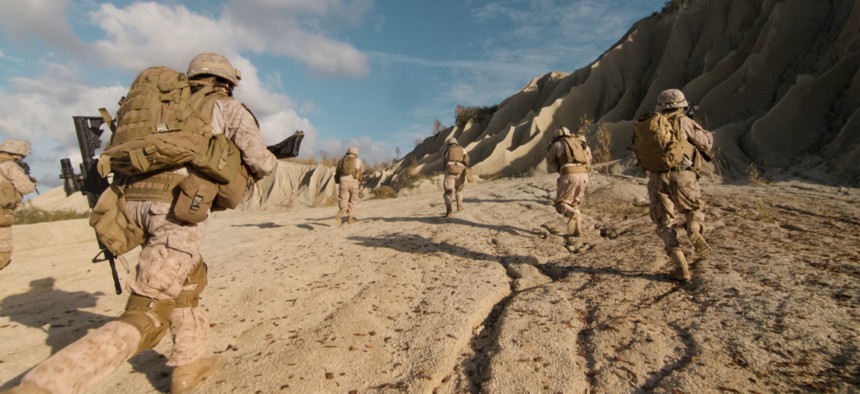Military Seeks Tech to Extract Drinking Water From the Atmosphere for Troops

Gorodenkoff/Shutterstock
The Pentagon’s research agency launched a new program and solicitation to develop cutting-edge devices that troops can use to capture potable water straight from the atmosphere.
Like all humans, U.S. military troops need water to survive and thrive. But the complex and often low-resourced environments they’re deployed to render delivery and access to potable water difficult, and at times even life-threatening.
The Pentagon’s research arm aims to change that.
The Defense Advanced Research Projects Agency wants innovative proposals that will catalyze the development of next-generation sorbent materials and modern systems to seamlessly extract water directly from the atmosphere to serve warfighters on the ground, according to a broad agency announcement released this week.
“The demand for drinking water is a constant across all [Defense Department] missions, and the risk, cost, and complexity that go into meeting that demand can quickly become force limiting factors,” Seth Cohen, program manager of the agency’s new Atmospheric Water Extraction program said in an early-December statement regarding the impending solicitation.
To provide troops with drinkable water to date, the military depends on transported bottles of it, or the purification of regional water sources—“neither of which are optimal for mobile forces that operate with a small footprint,” Cohen noted.
In the BAA, the agency adds that purification efforts using contemporary systems can endanger personnel, as local water sources are not always located in secure areas. The cutting-edge water production technologies used today, such as dehumidifiers, are unsatisfactory in size and power and can’t harvest water from areas with low humidity air, like in Kandahar, Afghanistan. And the delivery of bottled water via aircrafts and trucks (which the military relies most heavily on presently) can also be costly and wasteful. Officials add that that water is a crucial resource in humanitarian and disaster relief efforts and that distribution sometimes leads to “avoidable casualties.”
“By providing a ubiquitous source of potable water, [the program] will eliminate the ability of adversaries to use water as a tactical or destabilizing leverage point, thereby reducing the likelihood of interstate water conflicts,” the solicitation reads.
The program is set to take place over two phases, each lasting 24 months. The ultimate aim, according to DARPA, is to harvest water on the spot and directly from the air to meet the daily needs of military personnel, even in the driest areas. Participants will help the agency in providing “potable water for a range of military needs by developing low-powered, distributable systems that can provide potable water anywhere, anytime, and without the need for any external liquid water source.”
The Atmospheric Water Extraction program encompasses two tracks: the first is to create a unit to meet the daily needs of individual warfighters deployed in the field, and the second is to create systems that will meet the daily drinking requirements of up to 150 people. The program also includes two technical areas that will run concurrently throughout its duration—and officials in the solicitation emphasize that proposals must address both. For the first, the participants will be expected to develop state-of-the-art sorbent materials that can swiftly extract water from ambient air and then subsequently release it. For the second area, they’ll need to design systems that can leverage their newly-developed materials to transfer potable water from the air. Drinkability will be a “necessary feature” in the final prototype device.
“If the AWE program succeeds in providing troops with potable water even in arid climates, that gives commanders greater maneuver and decision space and allows operations to run longer,” Cohen said. “Ultimately, the technology could even diminish the motivation for conflicts over resources by providing a new source of drinking water to stressed populations.”
DARPA notes that multiple awards could be made, depending on the quality of proposals and availability of funds. The agency will host a proposers’ day Jan. 7 and interested parties are encouraged to submit proposal abstracts by Jan. 28. Full proposals are due March 12 and the BAA will close the following day.






